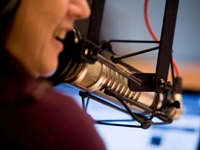 This question has been discussed and debated for many years. When I first got into the radio business it was dominated by males with big deep voices. If you couldn’t rattle the glass in the studio with your dulcet tones you were never going to make it to the major markets. Years later we found out through research and focus groups that these big male voices actually frightened listeners, especially if they were younger and/or female.
This question has been discussed and debated for many years. When I first got into the radio business it was dominated by males with big deep voices. If you couldn’t rattle the glass in the studio with your dulcet tones you were never going to make it to the major markets. Years later we found out through research and focus groups that these big male voices actually frightened listeners, especially if they were younger and/or female.
So radio stations went looking for a new solution and we had to live through the “morning zoo” period when lots of hyped up jocks , typically two males in morning drive, used all kinds of wacky sound effects and noise to create “mayhem in the AM.” Over time, broadcasters worked out that this was not the secret to success, given the average household in the morning was noisy and crazy enough as it was without adding a wacky sounding morning radio program to all the noise.
Next came the trend to pair a male and a female together who sounded like they could be a married couple, and in some cases they were, or in fact became a couple as time went on.
Today, many of the most successful radio announcers sound like “real people” and what they say (the content) has become more important than the way you sound.
I am still frequently asked why the way someone sounds is important. Clearly, to be successful, any radio announcer must have a good grasp of the language they are speaking, be intelligent, well read and have that ability to relate to the majority of the target audience. That is the minimum standard and those that have the X factor are often the ones who become more successful than others. Helping radio announcers to become more successful is one of the things we do at ByrnesMedia.
Now there is some new research out (released 19 February 2014) that may in part answer the age old question why are some voices more attractive than others? One of the conclusions of this research is that we are attracted to voices that are similar to our own. It seems that the similarity makes us feel that we’re part of a certain social group.
“The voice is an amazingly flexible tool that we use to construct our identity,” Dr. Molly Babel, a linguistics professor at the University of British Columbia in Canada and the lead author of the new study. “Very few things in our voices are immutable, so we felt that our preferences had to be about more than a person’s shape and size.”
You can read more about this interesting research thanks to an article in the Huffington Post. If you would like to dig into the full study you can do so here thanks to PLOS One.